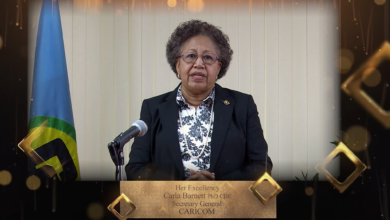By Andre Bagoo
CARICOM and its treaty laws relating to economic integration are an untapped resource for civil society, including the regional business and banking sectors, Caribbean Court of Justice (CCJ) President Sir Dennis Byron, 71, says today as the court marks its tenth anniversary.
In an interview with Business Day granted last week, the senior jurist called for civil society to lobby for implementation of treaty laws which could benefit them. In particular, he said treaty law could be used by banks on a regional level to better compete with foreign banks.
“The idea behind the treaty was to strengthen Caribbean banking and financial institutions because at the moment this area of economic activity is dominated by foreign banks and the local banks throughout CARICOM are in a weak position because they are too small and they cannot compete on an equal footing,” Sir Dennis said at his third-floor office at the CCJ, Henry Street, Port-of-Spain. “The treaty has set up a framework which enabled cross-border ownership and association which could have created larger footholds for the banking community in the region and the banks have not done it.”
Sir Dennis continued, “At the same time the CARICOM Secretariat has done a lot of work – such as model legislation – approved by various governments yet not put into operation. Still, there has been inaction from even the people who stand to benefit the most from it. Instead, everybody sits back. The framework is there but civil society has not been using it properly.”
On cross-border ownerships, Sir Dennis questioned whether it made sense for local banks to use provisions allowing them equal access to member state countries in order to better compete.
“You have several of the countries with national or cooperative banks but when you look at the ownership it is a relatively tiny percentage of the size of the foreign banks trading in their country in terms of the available,” the CCJ President said. “How do you compete? Would it be better if the indigenous banks came together to form a larger bank which would compete more equally with the foreign banks?” He said model laws have been developed which could implement the CARICOM provisions, yet these remain in abeyance.
“There are very specific provisions in the treaty calling on governments to remove discriminatory restrictions on the financial sector,” Sir Dennis stated.
“Model laws have been developed by CARICOM and signed off by a committee of Attorneys General. Somehow, nothing has happened afterwards. The institutions which have the professional know-how and have the most to gain from the implementation of those treaties have sat back and done nothing. There are so much we can do for the community.”
The CCJ President said generally the treaty laws are not being put to use even though they potentially have a very wide application.
“People have not identified the opportunities that they have,” Sir Dennis said. “You still see people complaining and making political statements when there are specific provisions that they could exploit to vindicate their legal position with a claim. Somehow or the other, people do not seem inclined to pursue their rights because there are many issues I see in the press that are covered by the treaty but people just complain.” The CCJ is the final court of appeal for all matters relating to CARICOM’s Revised Treaty of Chaguaramas.
The Agreement Establishing the Caribbean Court of Justice came into force on July 23, 2003, and the CCJ was inaugurated on April 16, 2005, in Port-of-Spain, the seat of the court.





